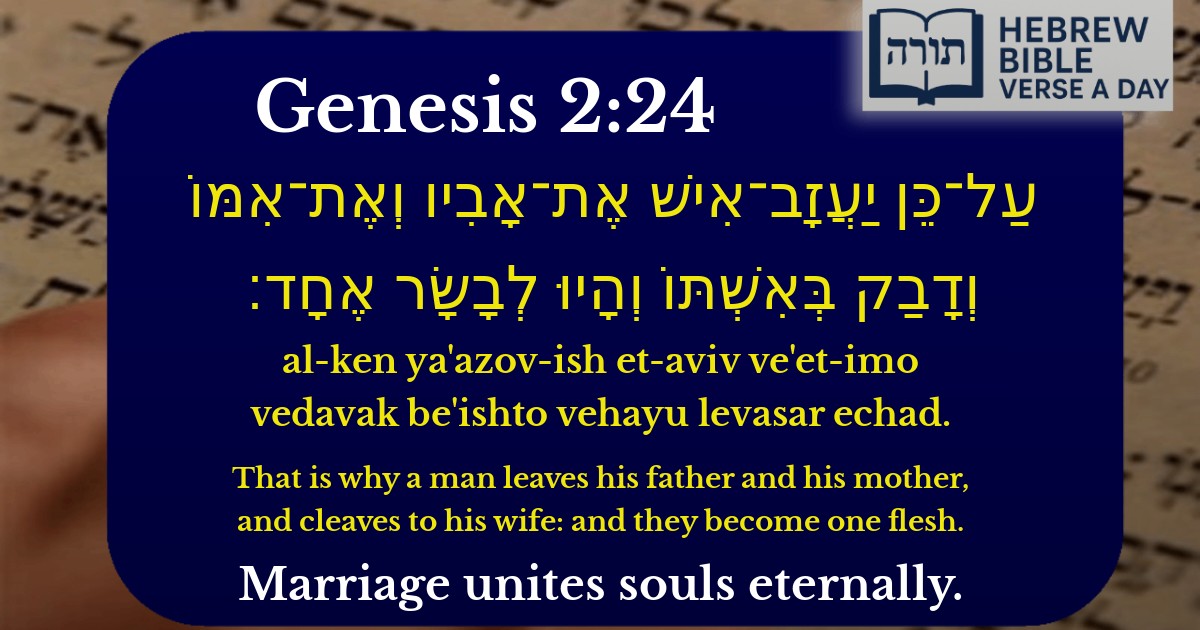Frequently Asked Questions
Q: What does 'they become one flesh' mean in Genesis 2:24?
A: The phrase 'they become one flesh' refers to the deep spiritual and physical union between husband and wife in marriage. According to Rashi, this unity signifies that through marriage, a man and woman become like a single entity, sharing a bond that is as strong as family ties. The Talmud (Sanhedrin 58a) explains that this also implies that children born from this union are a product of both parents, further emphasizing their oneness.
Q: Why does a man leave his parents to marry his wife (Genesis 2:24)?
A: The Torah teaches that marriage creates a new primary bond that takes precedence over one's relationship with parents. Rambam (Hilchos Ishus 15:2) explains that a husband's obligation to his wife comes first, as they form a new family unit. This does not mean neglecting parents but rather establishing proper priorities in building a Jewish home, as emphasized in halacha (Jewish law).
Q: How does Genesis 2:24 apply to marriage today?
A: This verse remains the foundation for Jewish marriage (kiddushin) today. The concept of 'cleaving' to one's spouse teaches that marriage requires active effort to maintain closeness. The Sages (Talmud Yevamos 62b) derive from this that a man must honor and provide for his wife, while the Midrash (Bereishis Rabbah 18:2) emphasizes the importance of emotional and physical intimacy in creating true unity.
Q: What is the significance of the order 'leave' then 'cleave' in this verse?
A: The sequence teaches an important lesson about proper relationships. The Kli Yakar explains that one must first properly separate from parental dependency ('leave') before fully committing to a spouse ('cleave'). This ensures the marriage is built on independence and maturity. The Talmud (Kiddushin 29b) discusses how parents' obligations to children change as children grow, making space for this new primary relationship.
Q: Does Genesis 2:24 mean husband and wife literally become one person?
A: No, it's a metaphor describing their profound connection. The Ramban explains that 'one flesh' refers to their shared life, goals, and intimacy - not physical merging. The Talmud (Sotah 17a) notes that when a couple merits divine presence in their marriage, the Shechinah dwells between them, enhancing this spiritual unity while maintaining their individual identities.


Explanation of the Verse
The verse "עַל־כֵּן יַעֲזָב־אִישׁ אֶת־אָבִיו וְאֶת־אִמּוֹ וְדָבַק בְּאִשְׁתּוֹ וְהָיוּ לְבָשָׂר אֶחָד" (Bereshit 2:24) describes the fundamental bond of marriage, where a man leaves his parents to unite with his wife, forming a singular entity. This concept is foundational in Jewish thought regarding marital relationships.
Rashi's Commentary
Rashi explains that the phrase "יַעֲזָב־אִישׁ אֶת־אָבִיו וְאֶת־אִמּוֹ" ("a man leaves his father and his mother") refers not to abandonment but to a shift in priorities. While one must always honor parents (as commanded in the Torah), marriage creates a new primary bond. The term "וְדָבַק בְּאִשְׁתּוֹ" ("cleaves to his wife") signifies a deep, inseparable connection, akin to the union of Adam and Chava (Eve), who were originally created as one being before being separated.
Rambam's Perspective
In Hilchot Ishut (Laws of Marriage), Rambam emphasizes that marriage is not merely a social contract but a sacred union ordained by Hashem. The phrase "וְהָיוּ לְבָשָׂר אֶחָד" ("they become one flesh") reflects the idea that husband and wife are united in purpose, shared life, and mutual responsibility, forming a complete spiritual and physical entity.
Midrashic Insights
Talmudic Interpretation
The Talmud (Kiddushin 2b) discusses the legal and spiritual dimensions of marriage, noting that the act of "דְּבִיקָה" ("cleaving") implies exclusivity and lifelong commitment. The term "בָּשָׂר אֶחָד" ("one flesh") is also interpreted as referring to the children born from this union, who embody the physical and spiritual merger of both parents.
Kabbalistic Understanding
In Kabbalah (Zohar, Bereshit 55a), the marital union is seen as a reflection of the divine unity between the Shechinah (Divine Presence) and the Holy One, Blessed be He. The phrase "לְבָשָׂר אֶחָד" alludes to the higher spiritual harmony achieved when husband and wife sanctify their relationship according to Torah values.